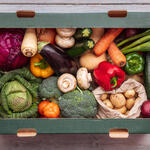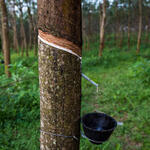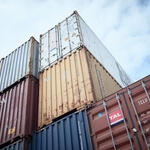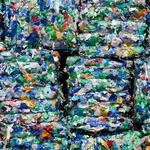- Date: 08 February 2022
Following the release of WWF's ReSource: Plastic Transparent 2021 report, we sat down with Lisa Morden, Vice President of Safety, Sustainability & Occupational Health at Kimberly-Clark, to discuss the company's involvement in the ReSource program, the importance of transparency, plus the greatest challenges and most promising solutions to the plastic waste crisis.
…
- Date: 03 February 2022
- Author: Julia Kurnik, Director of Innovation Startups, WWF Markets Institute
To most people, the United States Postal Service (USPS) is a low-cost way to send a letter, but here at the Markets Institute, we believe it has the potential to deliver more than just mail.
In spring 2020, people stayed at home and cooked more, grocery store shelves were bare, and farmers serving commercial food businesses were stuck leaving healthy food to rot in fields. And this was all happening as food insecurity skyrocketed. These problems weren’t new, but exacerbated, so we began to rethink how we get healthy produce to people. This sparked conversations with farmers, food hubs, the USPS, USPS unions, elected officials, hunger relief groups, and others, a business case, and popular interest. The result? An idea for “Farmers Post,” a third-party led platform to allow farmers to ship produce directly to consumers via the USPS, improving market access for small and minority farmers while simultaneously expanding access to healthy, fresh, local produce for consumers across the US.
- Date: 01 February 2022
- Author: Rodney Irwin, Chief Operating Officer, WBCSD and Jason Clay, Senior Vice President, Market Transformation, WWF
Last year marked a turning point for nature - protecting our forests, grasslands, and oceans has become a business-critical issue for companies around the world. As we saw at COP26, nature is now right up there with climate change on the business agenda.
In fact, a new consensus is emerging - across global and national policymakers, major investors, NGOs and consumers - that our global economy must not just become net zero but also nature positive.
- Date: 06 January 2022
- Author: Susan McCarthy and Lorin Hancock
For the first time we, the editors of Sustainability Works, want to step out from behind the curtain and talk a little about some of the incredible content we’ve had the pleasure to work on this past year.
As every other year-end wrap up has noted, 2021 was… a challenge. But one thing we are truly grateful for is the fact that environmental sustainability hasn’t fallen off the radar. In fact, it feels like this topic is more top-of-mind than ever before. As the impacts of climate change and environmental degradation are felt more and more each day, there’s plenty to be concerned about and it’s easy to get discouraged. Therefore, it’s a relief to us—and hopefully you as well—to be able to discuss some of the solutions on this blog. We are truly seeing remarkable action from all sectors, with strong leaders emerging to help tackle our greatest challenges.
Here are a few of our favorite posts from 2021:
- Date: 20 December 2021
- Author: Sheila Bonini, Senior Vice President, Private Sector Engagement, WWF
With 2021 coming to a close, I want to reflect on the conservation impact we’ve made throughout the year. Thanks to our supporters and partners in conservation, we’ve turned another unprecedented and challenging year into one fueled with progress toward a more sustainable world.
Scroll through the photos below to see just a few of our successes in 2021:
- Date: 16 December 2021
- Author: Amy Smith, Director, Forests, Sustainable Natural Rubber, WWF
Major commodity sectors, such as palm oil and pulp and paper, have been tackling sustainability and deforestation challenges for decades. The natural rubber sector is newer to the sustainability race. It only started addressing these issues over the last five years.
Despite the opportunity to learn from other sectors, the natural rubber sector still lags far behind in supply chain transparency and sustainability. While there’s been some recent progress, we are calling on industry leaders to fully join the race. They must disclose where their rubber comes from and the conditions under which it’s produced.
- Date: 10 December 2021
- Author: Jason Clay, SVP, Markets & Executive Director, WWF Markets Institute
The elephants in the room these days appear to be credible traceability and transparency. Downstream buyers want to know more and more about where and how their food is produced. To date, this has generally been left to food manufacturers and government agencies to ensure, but in the age of social media and infinite cloud-based information that’s changing.
Companies can no longer set up their own verification programs and expect them to be considered credible. ‘Trust but verify’ is increasingly the norm—and for good reason. The more we find out about global supply chains the less comfortable we are. Most companies are relatively good about knowing their direct suppliers, but it’s clear the trust and expectations can’t be extended further upstream. A piece this week on açaí illustrates the point—companies cannot depend on certification programs to credibly verify conditions of isolated producers. And where there is chatter on social media about problems, companies cannot hide behind systems, they need data. Much can be done to fix this issue, some listed below, but it will be interesting to see what exporters actually do.
To be clear, the goal is not de-commodifying the trade of all food products. That would create chaos. The goal is to maintain the efficiency of the commodity trading system but to add additional data about where and how it was produced. Changing the rules about commodities is not uncommon—the color of #2 “yellow” corn was not officially agreed upon until the late 1960s, and GMO-free commodities are traded to the EU where the market requires that information. So, the system is flexible enough to change and robust enough to incorporate new data.
Still, it’s surprising that systems to eliminate slave, bonded, and child labor, as well as deforestation and other habitat and biodiversity loss and GHG impacts, are so prevalent in supply chains, but apparently are not always working. Traders have said that rules of commodity trading should be left to them, but to date, they have been unwilling or at least unable to address these issues. With regard to labor abuses, we have seen governments (e.g., the US and EU) take much tougher positions for anyone who touches a product produced with illegal labor (with the notable exception of illegal farmworkers in the US). We have not seen the same response for key environmental impacts—though countries are in discussions about deforestation. Perhaps the way to address that is for everyone who touches products with embedded GHG emissions to “own” those emissions until they are mitigated. That would speed up change. Think about it.
…
This post is an excerpt from the WWF Markets Institute's Rethink Food weekly newsletter containing analysis of emerging issues and commentary on recent news stories. Subscribe here.
- Date: 08 December 2021
- Author: Erin Simon, Head of Plastic Waste and Business
Transparency is a critical piece to any corporate sustainability journey, as it raises the bar for accountability which in turn accelerates action. And for the plastic waste crisis, when corporate transparency is paired with cross-sector collaboration, we break down silos and unlock access to new data that sheds light into where and how companies can make the most impact on plastic pollution.
That’s why in 2019, WWF set out to find a way to expand transparency around plastic waste by launching ReSource: Plastic to ask – how can companies really make a difference on plastic waste? With the release of Transparent 2021, our second annual report from the ReSource program, we’re starting to be able to answer that question and it’s helping us fill in that “how” gap.
- Date: 23 November 2021
- Author: Melissa D. Ho, Senior Vice President, Fresh Water and Food, WWF
“When will leaders lead?” Mia Mottley, the Prime Minister of Barbados asked on the opening day of COP 26. As this “Super Year” of global events, including the UN Food Systems Summit (UNFSS), the Convention on Biological Diversity (CBD) Conference of Parties (COP), and the Climate COP 26, concludes, I ask myself, did leaders lead?
- Date: 23 November 2021
- Author: Alex Nichols-Vinueza, Program Manager, Food Loss and Waste
For most of us, Thanksgiving is all about the food. And for those looking to have a more environmentally-friendly Thanksgiving this year, the number one thing we can do is take steps to value the food we’re serving. This starts with us recognizing all of the resources that go into producing our Thanksgiving meal (long before we purchase our ingredients at the supermarket), and it ends with us doing our part to make sure none of it goes to waste.







